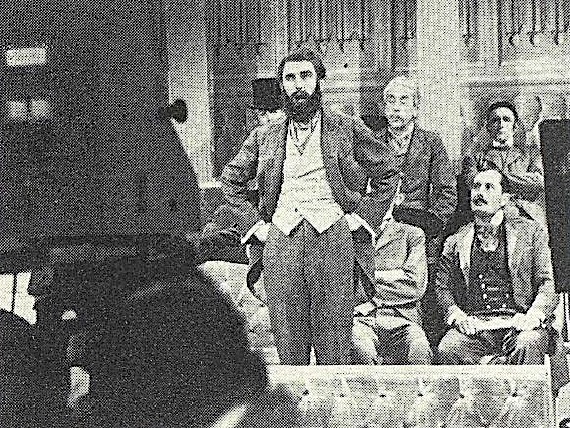OTD in early British television: 18 July 1939

John Wyver writes: On the evening of Tuesday 18 July 1939 Irish playwright and producer Denis Johnston presented The Parnell Commission (above), a reconstruction of the forgery investigation of 1888-89. Johnston had made this as a radio feature some months before, and now he brought together a large cast to act out the judicial inquiry into allegations of crimes by Irish parliamentarian Charles Stewart Parnell which resulted in his vindication.
‘The Scanner’ in Radio Times trailed the transmission in this way:
[A]ll the principal characters… will be made as real to life as possible by being modelled on contemporary Spy cartoons and pictures in the Illustrated London News. You will thus be deprived of Clark Gable, but you will see Parnell with a beard, more or less as he was when The Times printed a letter in 1887 implicating him in the Phcenix Park murders.
Here then is the beginning of the form that would later become identified as ‘drama documentary’.
The Times was enthusiastic about this reconstruction of events from just over fifty years before:
Mr. Denis Johnston, wbo wrote the script and produced it, is not only a playwright and a television producer but a lawyer and an Irishman, and it was with the keen interest of the lawyer that the investigations of the Parnell Commission were dramatized for viewers.
Mr. Mark Dignam gave us a Parnell who could be loved, trusted, and blindly obeyed, a man who towered over his compatriots as a giant among pygmies, and in a series of cleverly contrived scenes the high and respected position of Parnell in the House, in his own party, and in the country was indicated.
The examination of witnesses by the Attomey-General (Mr. Wilfrid Walter) and the masterly cross-examination of Pigott by Sir Charles Russell (Mr. Felix Aylmer) were beautifuily carried out, and so was the candid little scene with Kitty O’Shea (Miss Olga Edwardes), which was treated as a mere incident in the drama.
The whole political scene came before our eyes with dramatic force, giving us a portrait of the Irish leader in his hour of trial arid triumph and breathing life into the dry pages of the Special Commission’s report.
And in The Listener Grace Wyndham Goldie largely concurred:
This was a prize. The story of the Pigott forgery has a natural dramatic shape which is almost perfect; the plot, the threat to the hero, the trial, the exposure of the villain, the final suicide. But in Mr. Johnston’s version it involves a series of monumental scenes. The remarkable thing about his production was that he gave the illusion that these scenes were crowded and complicated and yet presented nearly all the action in a telling set of close-ups.
There were flaws, certainly. The chief of these was that the acting was so noticeably uneven. Mr. Felix Aylmer, as Sir Charles Russell, gave a most amusing and subtle performance. Somewhere in the middle regions came Mr. Mark Dignam’s effective Parnell. But the Pigott and the Mrs. O’Shea were much less satisfactory.
Then the technical problem of linking the scenes was not fully solved. We were given a story-teller and a listener. This is a dangerous proceeding. Apart from a host of other considerations it is always difficult for the listener not to give the impression that the story has been heard through a week’s rehearsal.
The lighting, too, was often faulty. It was directed with particular crudeness on to the witness-box so that the witnesses gave evidence of grease paint and wig-joins as well as of fact. But none of this detail mattered seriously. For the production as a whole was as inventive and ingenious as any l have seen.
[OTD post no. 213; part of a long-running series leading up to the publication of my book Magic Rays of Light: The Early Years of Television in Britain in January 2026.]
On Bluesky ‘Adam B’ asked earlier:
‘Do we know how closely the script stuck to what was recorded of the trial? Might we also consider it an early example of “verbatim theatre”, a form that is still current & urgent? ‘
His point is well-taken, and indeed Johnston’s broadcast does seem very close to the verbatim tribunal productions that the Tricycle Theatre specialised in across nearly two decades,
https://www.concordtheatricals.co.uk/s/52277/the-tricycle-collected-tribunal-plays-1994-2012
and which take a contemporary form in this urgent work discussed here: https://www.theguardian.com/world/2025/jul/18/its-ourselves-and-society-on-trial-playwright-adapts-gisele-pelicot-case-for-stage
I don’t know if a script of ‘The Parnell Commission’ exists, which would allow us to see how much of the trial transcript itself was incorporated, but when I am next at the BBC Written Archives Centre at Caversham I will try to seek one out.